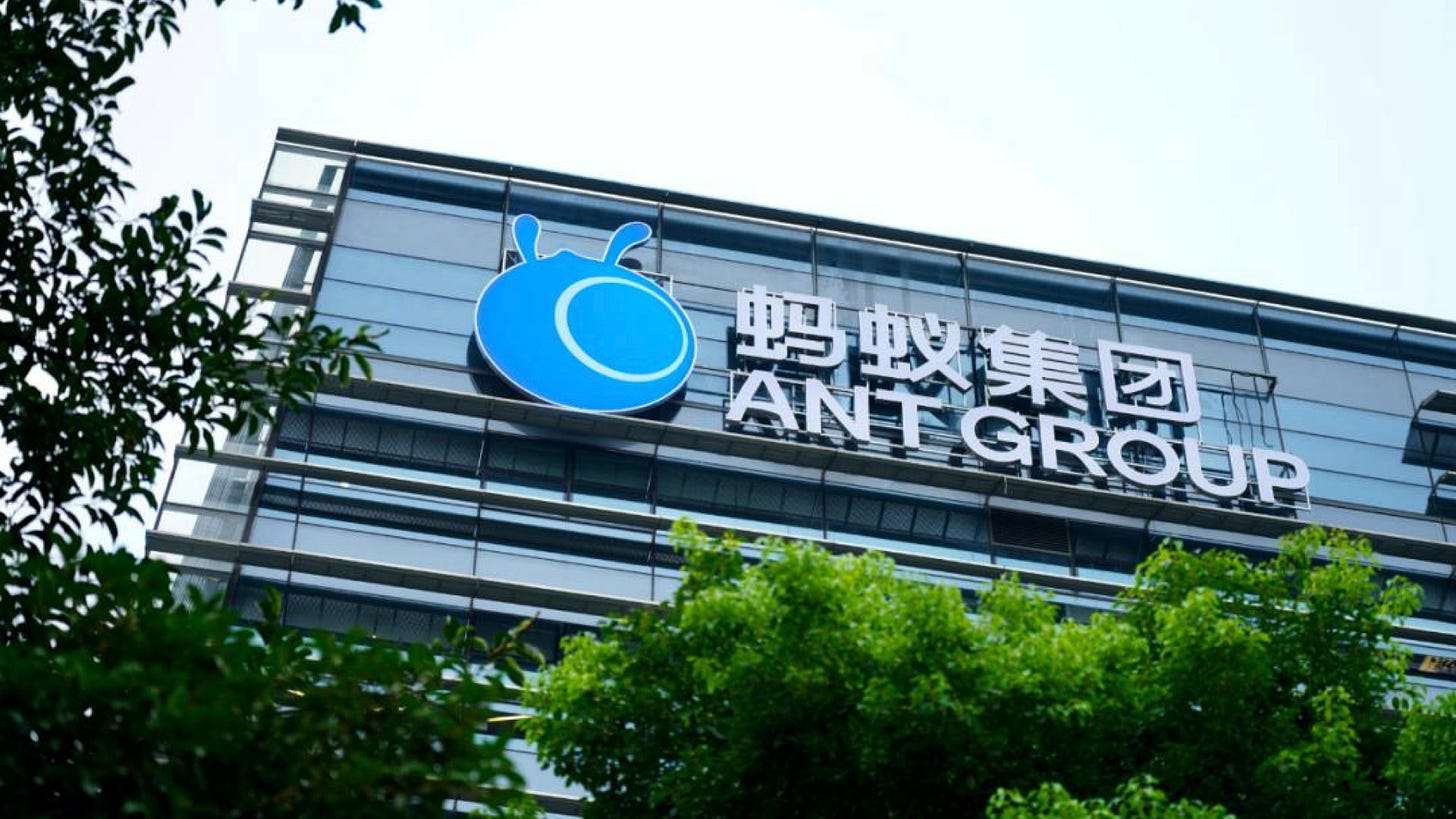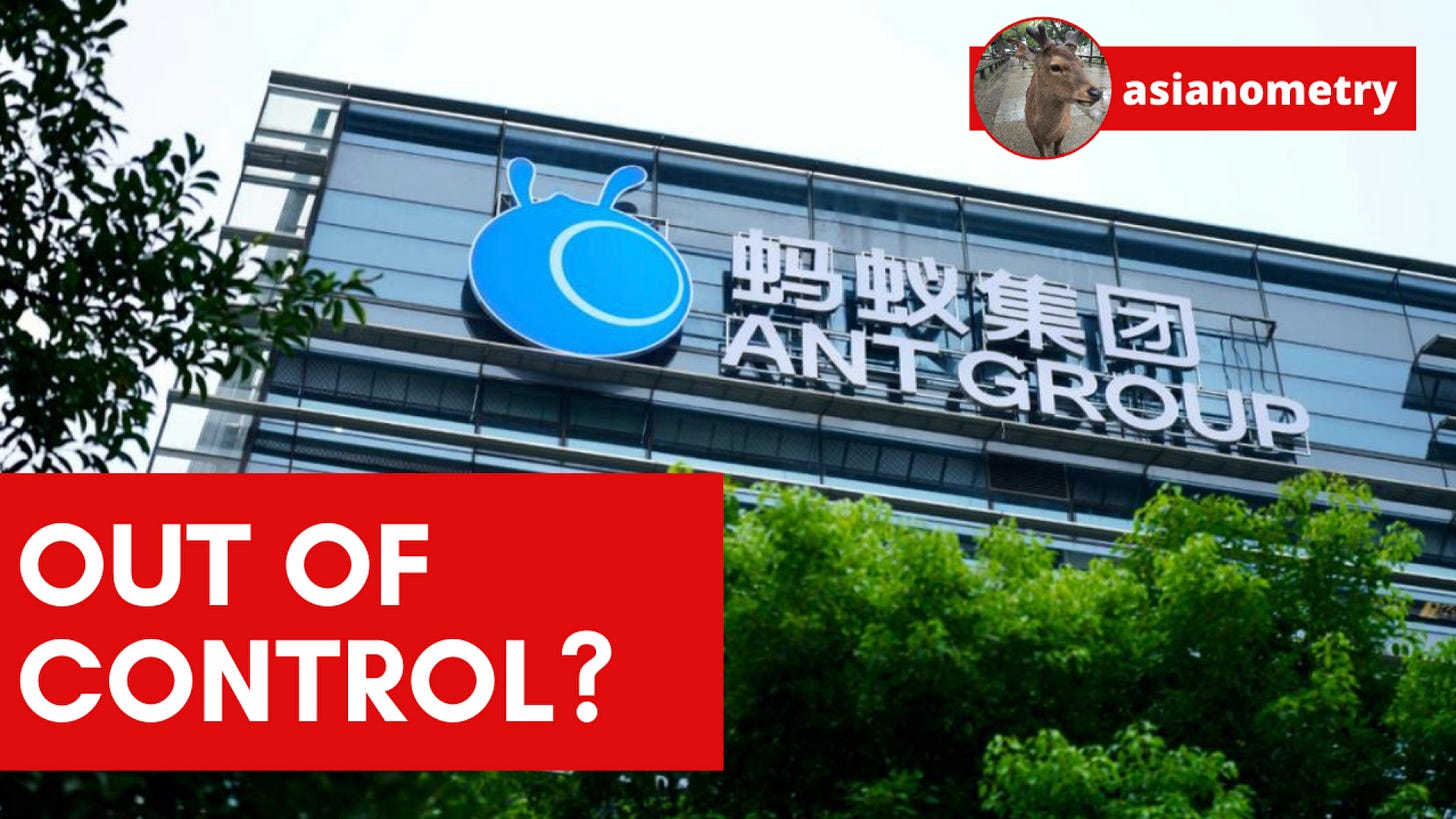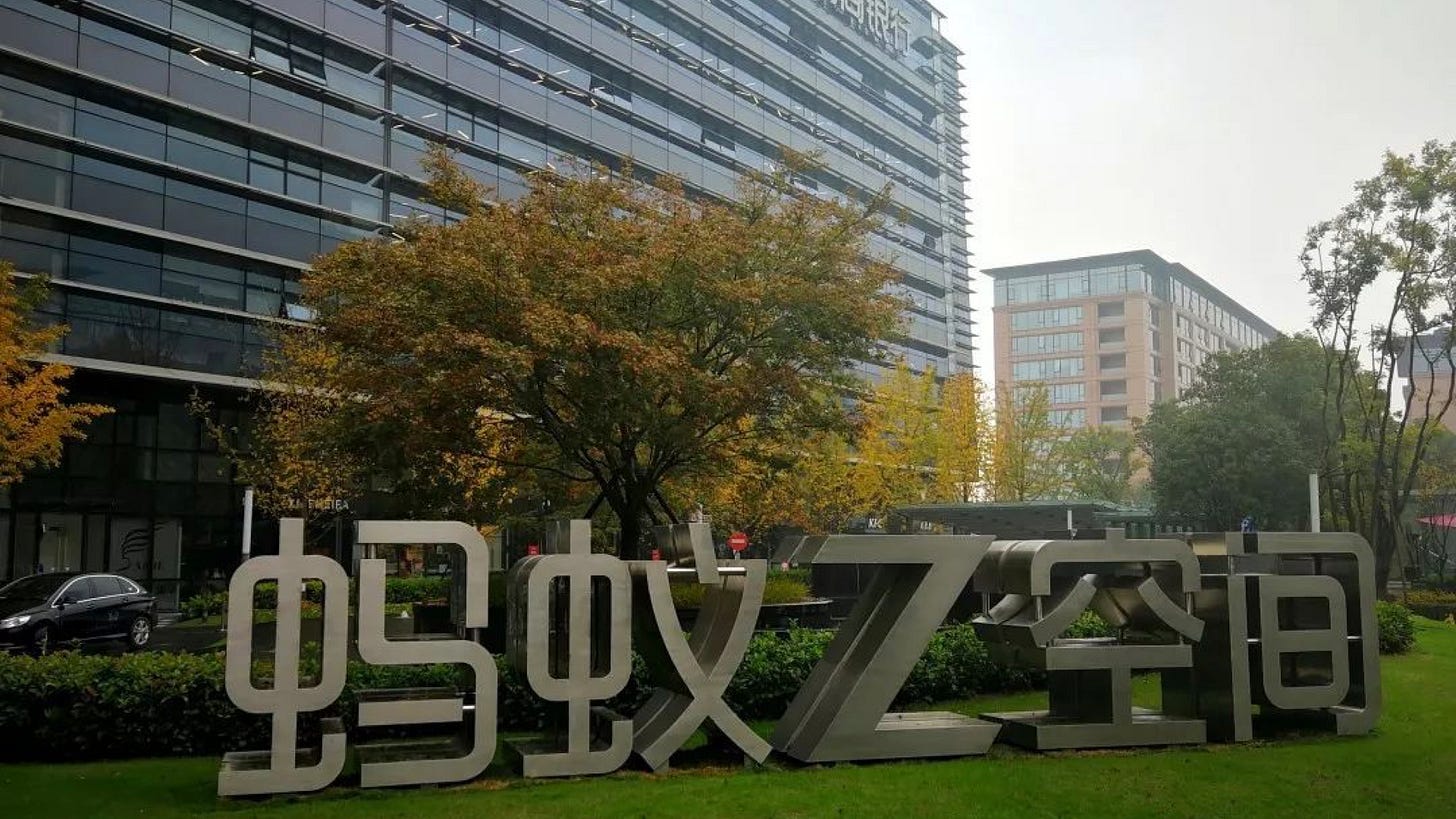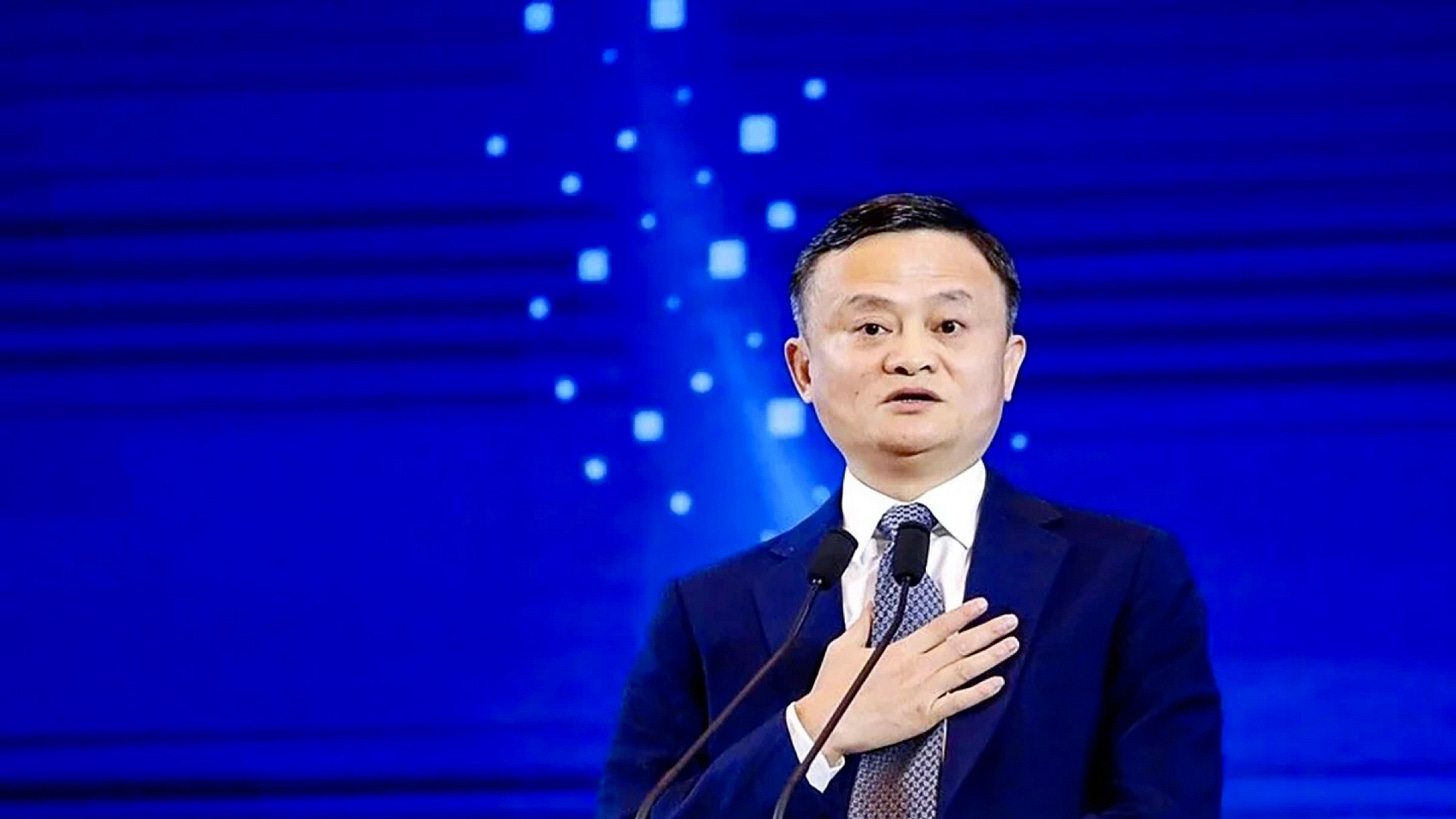Is Ant Group a Risk to China's Financial System?
Updated with new information
Author’s note: If you want to get started with watching the video, you can see it below.
This video was made a few weeks ago and some new information has come up. I still largely stand by the video, but since this email is coming out I think it is worth adding a few new items about things that have come up since I made it.
WSJ reported that Chinese President, Party General Secretary Xi Jinping personally made the decision to stop the IPO. A number of senior financial regulators had been at the fateful summit speech and they got pretty angry at what Jack Ma said. Xi’s office compiled a briefing document that included stories about how young people would get into a spiral of debt using Ant’s products.
Something interesting to me is that one of the reports delivered to Xi concerned public sentiment about the Jack Ma speech. I wonder if it means something like rigorous polling or a collection of random angry commenters. But it is illustrative of the fact that the modern CCP is a consultative body and responds to pressure from the grass roots.
After reading a bit more, it seems like the consensus is that the decision to stop the IPO was not just related to angry regulators’ egos, but was the final boss battle between Ant and the regulators with regards to its micro-lending platforms. These platforms are very profitable, constituting some 40% of Ant’s revenues and generated $2.6 billion in profit last year.
The prospectus had apparently opened regulators’ eyes to just how much money Ant was making by lending other banks’ money. The new rules force Ant to make some of the micro-loans itself and hold them on their books. This essentially will force Ant to be a bank, raising a bunch of money and having them hold cash on their books. Considering how much money ICBC and the other members of the China Big Four banks make though, it might not be the worst thing ever.
A bit later, China came out with a series of serious new anti-trust laws targeting the big technology companies which includes Ant Group parent Alibaba. They hit on things like exclusivity agreements and using monopoly profits to subsidize products (explicitly mentioned below in the video). Rolling out these regulations on monopoly companies in China could conceivably be seen as a PR win for China. The US and the West have been debating this ad nauseam. Now suddenly, China strikes with these brand new regulations that fixes the “tech monopoly problem” while the West dithers.
Of course, let’s see if the regulations actually work before we start applauding them.
(I have a future video coming going much more in detail about the micro-loan Huabei product.)
November 2020, Chinese fintech giant Ant Group had been set for a titanic $34.5 billion IPO on the Shanghai and Hong Kong markets. The company would be worth something like $300 billion.
Jack Ma, the biggest individual shareholder, would be $27 billion richer. The IPO would have been the largest in the world and it sparked a frenzy in China over its shares.
But then Jack Ma gave a speech at the Bund Summit in Shanghai on October 2020. And then someone got pissed. Chinese regulators put the IPO on hold and then called Jack Ma and the rest of the senior Ant Group team to Beijing to do "supervisory interviews".
In this video I want to talk about how Ant grew so fast, its relationship with China’s banking system and what it means for the company going forward.
Ant Financial
I don't want to take too long here, but for those who are not familiar with this company, I want to give a brief - the briefest possible - overview of Ant Group.
The company began with Alipay, an escrow service for Alibaba's Taobao e-commerce platform. It allowed customers to buy items from sellers without worrying that their money would be scammed. Alipay helped facilitate their order as a trusted, neutral third party.
Alipay grew on top of Taobao to have 70% market share of the Chinese payments market by 2005. It was around this time that Alipay started to become a valuable part of Alibaba Group's overall valuation. American investors bought Yahoo stock simply because of the company's pure-luck ownership of a 40% stake in Alibaba.
So it was a bit of a shock that in 2009 (or 2010?), Jack Ma transferred Alipay (then valued at about $5 billion by itself) out of Alibaba Group into the company now known as Ant Group. It led to a year-long spat between Jack Ma and Alibaba's shareholders.
Jack argued that the transfer had been necessary due to Chinese regulations on foreigner ownership of financial companies. Yahoo was like, "When did this happen?" Considering how incompetent Yahoo was in its final years, I wouldn't count that out.
Anyway, the two settled a year later in 2011. In retrospect, the spinoff was good for Alipay. It allowed the company to focus on being its own thing. They could innovate and come up with new products free of the restrictions from its former parent company.
Ant's Advantages
So what is it about Alipay that got it to grow so big and so fast? Looking back at it, there are a few critical strategies.
First, like I mentioned earlier it was tied to the Taobao platform. Taobao being the dominant selling platform in China, so it was like an eBay and a PayPal situation. It introduced a lot of people to Alipay and got them comfortable with using it.
Second, Alipay did a lot of technical work to integrate with China's dominant banks. Starting in 2005, their developer team worked with two of China's big banks to integrate with their internal systems. To say the least, it was difficult. Achieving success here gave them a huge step up.
The third point is tied in with the second. Because of the work they did integrating with the banks' systems, Alipay made paying and receiving money really easy. With Alipay, payments was flexible, convenient and fast.
Alipay also did not charge a transaction fee. This is in line with how Taobao succeeded in the market. Taobao beat eBay China because it didn’t charge merchants anything to list and sell. This is in stark contrast with payment networks like Visa, Mastercard and UnionPay (China's version of the first two) - which took a percentage of the total transaction value.
Lastly, I mentioned that Ant's spinoff helped it focus on leveraging the success of Alipay into a total financial platform for the average user. And that's true. They've come out with a stunning lineup of products that leverage Alipay's titanic scale nationwide.
Bloomberg splits it into four big sections. Ant does more than just transfer money from buyers to sellers. It also helps you invest your money, get a loan from a bank, and lately, buy health insurance.
In corporate speak, they call it "land and expand". You first hit with one big product - in this case, Alipay (or maybe Alibaba's Taobao) - that customers use. Then you leverage the eyeballs you get from that flagship product to sell your audience other products.
Alipay customers had excess cash in their accounts not earning interest, so Ant introduced Yu'ebao. Now Yu'ebao is China's largest money market fund with $170 billion of assets. And Yu'ebao users can't leave the ecosystem unless they disconnect themselves from TWO products. So it goes until the company basically owns you.
America's tech giants all do the same thing. Google's first big hit was Google search. They use it to cross-sell Google Calendar, Google Docs, Gmail, etc. Facebook used Facebook to scale up Instagram. Salesforce too in the B2B space.
Ant does face substantial competition in the Fintech space - JD and Tencent are also following the same pathway using the same strategies - but Ant is the eight hundred pound gorilla. But it's not a bank. Let's talk about China's banking industry.
Banks in China
Most countries have four big commercial banks dominating the country’s banking industry. In America for example, there is Bank of America, Citigroup, Wells Fargo and JP Morgan Chase. Together, they have 45% of all US customer deposits.
China’s Big Four are Bank of China, China Construction Bank, Agricultural Bank of China and the biggest of them all - Industrial and Commercial Bank of China. Together they hold 54% of the Chinese banking industry’s total assets. They are closely affiliated with the government and such associations give them an implied guarantee.
This guarantee also makes them some of the most profitable companies in the world. China’s Big Four banks make boatloads of money. They get access to the best, most profitable customers - state owned enterprises whose repayment capability are guaranteed by the government, for example. And they get to take advantage of regulations that favor them.
In return, the biggest banks serve as a policy organ for the government. Recent financial reform in China has meant more market exposure for China's banking system. The Party has repeatedly said that it wants to open up its financial markets. It has allowed more foreign ownership of securities firms and even some banks. Goldman Sachs for example now owns a 51% share in a Chinese securities firm.
Despite this reform, the Big Four remain instruments of policy. They are extremely politically connected. The government considers it vital to maintain control over the banking system. So there's a lot of regulations to comply with.
Either in response to potential objections from the banking industry or because they want to hold themselves apart from it, Ant evolved from directly offering financial services to being a platform facilitator of them. Yu’ebao for example. The high interest rate it advertises is provided by government owned banks. It’s not provided by Ant itself.
In this way, Ant gets to dole out its business to capture buy-in from the banks while at the same time retain the sexy, cutting edge innovation hat.
And again, this is not unique behavior. Square, the big fintech company run by Jack Dorsey. They have a loans business for small businesses but when Square supposedly makes a loan, the loans are provided by Celtic Bank, a small bank in Utah, working in partnership with them. This lets Square "offer" loans without actually subjecting itself to regulation. All fine and great, until loans start defaulting and the partner bank doesn't take them. Who pays for it then? Square.
The Speech
Okay we can finally talk about the speech now. Ha! Its full text has been released for the public to read and review.
Jack Ma opens the speech in reflecting a bit on his past and current position. He emphasizes that he is now retired and that the forum in which he's giving this unofficial speech is unofficial:
I think I have retired anyway. In an unofficial forum, I can speak freely and share the professional views of a layman and a non-professional person for your reference. It may be immature, wrong, and laughable.
He begins by arguing against blindly following western financial regulations set out by the west, simply because it is what Europe and the United States use. The Bretton Woods and Basel Accords are specifically called out. Ma says that Basel has restricted overall innovation in Europe with regards to financial regulation.
The Basel Accord is more like a club for the elderly. What it wants to solve is the problem of the aging financial system that has been in operation for decades, and the problem of system complexity. But China’s problem is just the opposite. China is not a financial systemic risk ... China’s finance is the same as other developing countries that have just grown up. In the financial industry, it’s a youth, without a mature ecosystem, and not fully flowing.
He then quotes President Xi Jinping and historical Chinese general Cao Cao before getting to what probably got him into so much trouble:
Supervision and management are not the same, policies and documents are also different. Today there are too many documents that are not allowed or that are not allowed. The policy is to build mechanisms and encourage development. Today we need "policy experts" instead of "document experts".
He mentions that Taobao had to create lots of policies on its own to respond to rapidly changing situations in the Chinese e-commerce space.
Later, he says again:
When the richness and depth of innovation far exceed regulatory imagination, it becomes abnormal, and society and the world will fall into chaos.
With regards to banks, many of whom are Ant's critical financial partners, Jack starts with an olive branch. Or a backhanded compliment, maybe.
Today's banks continue to be pawnshops ... This was a very powerful idea 100 years ago. Without mortgages and loan guarantees from these innovations, there would be no financial institutions today, and the Chinese economy would not have developed to this day in 40 years.
He then casually proposes replacing the monolith Chinese banking system with a micro-targeted algorithm based on big data:
The mortgage pawnshop thinking cannot support the financial needs of the world's development in the next 30 years. We must use today’s technological capabilities to replace pawnshop thinking with a credit system based on big data.
The reasoning for this is that poor people can't get started without some form of credit. But they won't get credit without having some assets to back them. The majority of available credit ends up going to borrowers who don't really need it as much.
It's a chicken-and-egg problem policy makers in other countries have grappled with. This is Jack's proposed solution. Replace the bankers with an algorithm. I don’t think the hundreds of thousands of people working in China’s banking industry would be thrilled about that.
Conclusion
In America, there is a big debate about the power of gigantic technology companies. Should they be more closely regulated? Are they stifling overall innovation? Should they be broken up? China is starting to have similar debates over its own tech giants like Alibaba, Tencent and ByteDance.
China's 13th Five-Year Plan (2016-2020) for Economic and Social Development pledged that the government would have a light regulatory touch on companies that operate in technology. Ant has taken advantage of this to grow.
Now its founder has made a provocative speech about the value of financial regulators. In doing so he ignores a long record of financial crises and regulation in world history. Financial crises can very easily happen in developing countries. He only needs to go to Hong Kong and bring up Wikipedia.
It also challenges not just the banks but the very government itself. Those regulators were probably not happy to hear that he holds these views. Xi Jinping's economically liberal team has made financial de-risking one of its big policy goals. This means having banks be more open about their financial holdings and raising the amount of capital they have on their books to withstand potential loan defaults.
Ant for a while had not been subject to some of those rules because of the ways they've structured their products. And for a while, they've succeeded in holding it off. I have a suspicion that this is not going to be the case for much longer.





